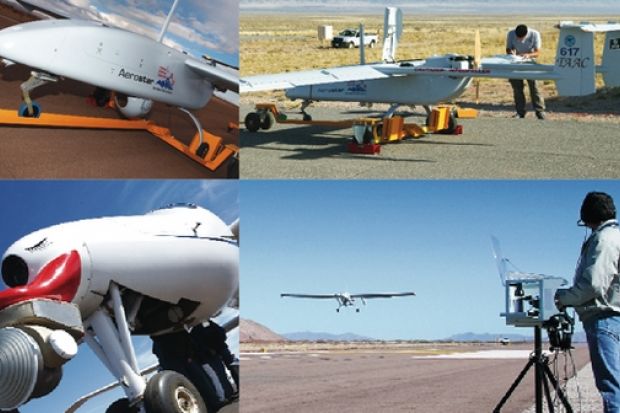The sight of nine aircraft rising into the unseasonably cold but clear blue skies over Albuquerque one morning last month did not seem particularly out of the ordinary. After all, it is the biggest city in the southwestern state of New Mexico, the sixth-fastest-growing urban centre in the US, and home to a large US Air Force base.
But these were not commercial planes filled with visitors and business people, nor were they military jets. These planes had no passengers at all. In fact, they did not even have pilots.
Now well known for their military applications, unmanned aircraft - known as "drones" - such as the ones in this small but pathfinding airshow have powered a wave of programmes at US universities and colleges such as New Mexico State University (which organised this demonstration) to develop, test and train operators to fly them.
"This is going to be the future of aviation, so it's just the natural progression of aviation education," said Ben Trapnell, associate professor of aerospace sciences at the University of North Dakota.
Two years ago, his university became the first civilian education institution to run a programme dedicated to operating drones.
Its first seven students graduated this year and all of them secured jobs immediately, Professor Trapnell said. A further 85 students are now enrolled, using new simulators in a university training centre at Grand Forks Air Force Base.
Students do not operate real drones as the craft are not allowed in US airspace, except along its borders and in wildlife preserves.
Indeed, the Albuquerque event was the first in the country to gain permission to launch a group of drones as a public spectacle. Some 500 people, many of them representing universities, attended the New Mexico airshow.
But this year, the Federal Aviation Administration is expected to begin the process of opening up the US skies to unmanned planes for police surveillance, pipeline inspection, crop dusting, aerial photography and disaster relief, to name just a few of the aircraft's potential uses.
Consultants have valued the global unmanned-systems market at more than $6 billion (£3.8 billion) a year.
The International Federation of Robotics predicts that this value will quintuple in the next three years.
Operators engaged
However, there is already a shortage of operators: in November, officials from the Customs and Border Protection division of the US Department of Homeland Security told a congressional committee that it cannot find enough trained operators for its drones.
The demands of the US military play a major role in this shortfall. It has 7,000 drones, which have been used in controversial bombing campaigns in countries including Pakistan and Afghanistan.
"The only group doing training for this has been the military," said Ted Beneigh, professor of aeronautical science at Embry-Riddle Aeronautical University in Florida. "But it can't train enough pilots."
Professor Beneigh is the coordinator of Embry-Riddle's unmanned aircraft-systems degree programme, which began this autumn. The university expected 10 to 15 students to sign up: in the event, 75 enrolled.
"There's job security," he said. "It's a burgeoning field."
Similar programmes have begun in Alaska and Arizona. At Kansas State University, enrolment on its drone degree tripled this year.
Steve Hottman, who runs the New Mexico State course, said he expected the boom to level off and for some entrants to struggle owing to "simple supply and demand".
While there are civilian uses for drones on the horizon, many newly minted unmanned-aircraft operators graduating from the universities will end up working for the military, Professor Trapnell said.
As a result, many who run programmes in the field cover not just technical issues but also ethical concerns.
"Whether you agree or disagree, this is what's happening now," he said. "Our students look at it as: 'We don't want to do something that's unethical. But we want to serve our country and we want to get the experience of operating unmanned aircraft in whatever regime.'"
Register to continue
Why register?
- Registration is free and only takes a moment
- Once registered, you can read 3 articles a month
- Sign up for our newsletter
Subscribe
Or subscribe for unlimited access to:
- Unlimited access to news, views, insights & reviews
- Digital editions
- Digital access to THE’s university and college rankings analysis
Already registered or a current subscriber? Login
